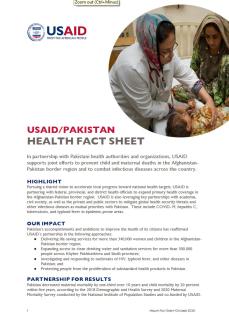The United States Agency for International Development (USAID) is partnering with the Government of Pakistan to prevent child and maternal deaths and combat infectious diseases.
SECTOR BACKGROUND
Since 2010, USAID has partnered with the Government of Pakistan’s national and provincial health authorities for improved health of the people of Pakistan. Together, we accelerated progress on national health priorities to expand primary health care coverage in key areas of the country. USAID also leverages key partnerships with academia, civil society, and the private and public sectors to address global health security threats and the spread of infectious diseases. USAID has focused on strengthening key healthcare policies, infrastructure and service provision; workforce training and development, including at the community level. USAID also supports the strengthening of maternal and child health, nutrition, and voluntary family planning/reproductive health services; strengthening public health supply chain capacities at all levels, as well as expanding disease surveillance and response capacity.
SECTOR PRIORITIES
Improving Maternal, Child and Reproductive Health
USAID is working with the Government of Pakistan at all levels to strengthen the quality of and access to essential health services, especially for women and children. This includes improving reproductive health and voluntary family planning services as well as nutrition services for children under five and pregnant and lactating women.
Combating Infectious Diseases
USAID has helped Pakistan prevent the spread of infectious diseases, broaden access to medical care, train healthcare providers, and modernize delivery systems for critical medicines. This includes support for National and Provincial tuberculosis (TB) programs to improve prevention, detection and treatment of TB, strengthen management of drug-resistant TB, advance laboratory capacity, and engage local organizations to strengthen social support services.
Strengthening Global Health Security
USAID is working in partnership with Pakistan to advance Global Health Security, building on a strong foundation of health systems strengthening investments. USAID supported digital health solutions that created better visibility and easier access to infectious disease data and helped inform decision making. USAID also supported the Government of Pakistan to create emergency response centers across Pakistan to accelerate detection and response to emerging infectious disease outbreaks in real time. These improvements resulted in a more efficient government response to health crises, including the COVID-19 pandemic, and laid the foundation for expanding Pakistan’s ability to prevent, detect and respond to emerging infectious diseases.
Improving Access To Safe Drinking Water and Basic Sanitation Services
USAID invested in infrastructure in Pakistan that provided 2,266,208 citizens with access to basic drinking water services and 702,350 citizens with basic sanitation services. These interventions improved health outcomes and helped prevent the spread of infectious disease. Through the ownership of local municipal services institutions, these projects are not only relevant and effective, but also largely sustainable.
KEY RESULTS
Since 2010, USAID has trained over 60,000 health service providers to increase access to integrated, equitable, and quality health services and medical products, and to strengthen leadership and governance in the health sector. USAID’s training has resulted in a more competent and skilled workforce able to deliver higher-quality and expanded coverage of basic health services, including maternal, newborn and child health, and family planning.
Strengthened health facilities that provided over 13 million women and children with high-quality basic health services.
Worked with the Ministry of Health to establish a Health Policy and Implementation Unit that serves as the technical directorate for the Ministry.
Supported Pakistan’s Health Programs through development of key strategic and policy documents, including Universal Health Coverage Benefit Packages for all provincial and regional governments, a National Lady Health Workers Strategic Plan (2022-2028), and a National Digital Health Framework (2022-2030).
Supported the Sindh Health Department’s restructuring which integrated vertical disease programs into the routine health system.
Provided extensive support for Pakistan’s COVID-19 response, including strengthening manufacturing and distribution of personal protective equipment, donation of refrigerated trucks and medical oxygen commodities, and supporting COVID-19 vaccination efforts for both adults and children.
Established provincial and district disease surveillance and response units and trained rapid response teams in all 157 districts, and scaled up the Integrated Disease Surveillance Response system in over 20 districts.
Expanded Pakistan’s access to mobile laboratories, improving disease detection in areas impacted by the 2022 floods and improving country capacity for future outbreaks.
Invested in infrastructure that provided over 2 million citizens with access to basic drinking water services and 700,000 citizens with basic sanitation services. These interventions were not only effective in preventing the spread of infectious disease, but were also efficient and largely sustainable.
Constructed a hospital in Jacobabad and multiple hospital wards in Karachi.
Current/Ongoing Activities
Building Healthy Families Activity
Unicef Nutrition Support
Momentum Private Healthcare Delivery
Momentum Country And Global Leadership
Promoting The Quality Of Medicines Plus
Global Health Supply Chain - Procurement And Supply Management
Health Services Academy
Human Development Activity
Integrated Health Systems Strengthening And Service Delivery
Tuberculosis Local Organization Network

